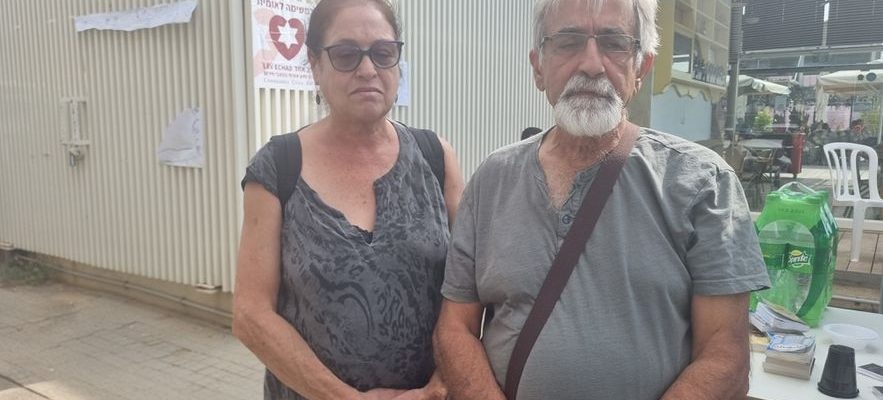Industrial area of Ben Gurion International Airport in central Israel. Since Sunday October 8, the military command has set up a building to accommodate hundreds of families without news of their loved ones, missing since the start of Hamas’ unprecedented offensive against the Jewish state. Near the entrance guarded by police officers, Yaël and Moshe Lotem explain that their daughter Agar and her three children aged 10, 8 and 4 were kidnapped by fighters from the Islamist movement who infiltrated the Kibbutz Kfar Aza, near Gaza.
“Witnesses saw the scene and saw my daughter going out with her children and armed men who were threatening her,” says Moshe, the gray-haired father. “We are very worried. The little neighbor, also 4 years old, also taken away. Her parents were killed.” The looks are tired. “When I’m hungry, I think of my daughter and I wonder if she’s hungry too, when I’m cold, I wonder if she’s cold too,” confides Moshe before interrupting himself, overwhelmed by the emotion. His wife speaks. “The fact that they kidnapped them and not killed them makes us stand,” confides Yaël, who hopes that Hamas “will have pity” on the hostages and release them all. “The families who come here are in extreme distress,” explains Efrat Hermel Saar, a social worker mandated by the government. “They don’t know much about the fate of their loved ones.”
Moshe and Yaël Lotem have no news from their daughter and her three children.
© / Alexandra Vardi / L’Express
DNA samples
Hamas commandos who entered several Israeli towns bordering the Gaza Strip massacred residents and kidnapped around a hundred men, women and children. The latest reports show at least 1,200 people killed in Israel and nearly 3,000 others injured. Not all have been identified. Also, families are asked to bring photos and personal effects of their loved ones to the center and to provide as much information about them as possible. On site, they also take a DNA sample. So many elements that could help elucidate the fate of the missing.
“They still hope to find them alive, but we know that this percentage drops as the days go by. It’s very hard, says Efrat Hermel Saar. We have no answer to give them. The only thing we can What we do is to help them get through this terrible moment. We offer them support and psychological support.”
Sitting and curled up on the steps of the imposing building, Inbar Goldstein, 35, cries her eyes out. His brother and his 12-year-old niece were reportedly killed in Kfar Aza, and his three other nieces and nephews kidnapped along with their mother. “It’s very vague, she said. All we know is that residents were murdered in their homes, in their beds. I want to believe that they will come back,” she said before rush into the hall of the building to find other families of the missing. For everyone, a new day of waiting and anxiety begins.
